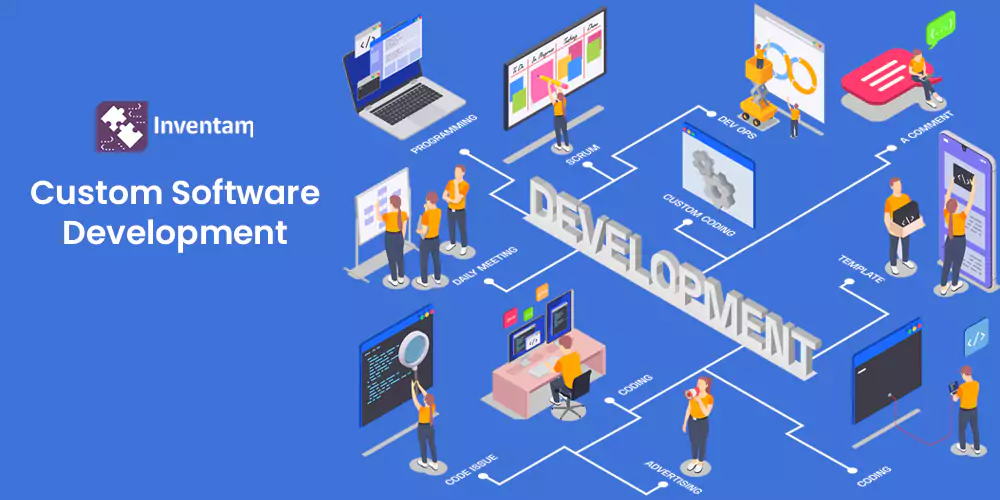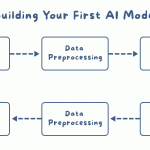- Introduction: In the ever-evolving landscape of technology, custom software development plays a pivotal role in driving digital transformation for businesses. As organizations strive to stay ahead in a competitive market, it is essential to stay informed about the latest trends shaping the software development industry. In this blog, we will explore some of the most prominent custom software development trends that are revolutionizing the way businesses operate and cater to their customers.
- Low-code and No-code Development: Low-code and no-code development platforms have gained significant traction in recent years. These platforms enable businesses to build software applications with minimal coding knowledge, empowering citizen developers and accelerating the development process. By abstracting complex programming tasks, low-code and no-code development platforms enhance productivity, shorten development cycles, and provide cost-effective solutions.
- Artificial Intelligence and Machine Learning: The integration of AI and ML technologies in custom software development has unlocked a myriad of possibilities. From intelligent chatbots and virtual assistants to predictive analytics and data-driven decision-making, AI and ML are reshaping industries across the board. Leveraging these technologies allows businesses to automate tasks, gain valuable insights from data, and deliver personalized user experiences, ultimately improving operational efficiency and customer satisfaction.
- Agile and DevOps Practices: Agile methodologies and DevOps practices have become fundamental in the realm of custom software development. Agile enables iterative development, collaboration, and adaptability, ensuring that software solutions meet evolving business requirements. DevOps, on the other hand, promotes seamless integration between development and operations teams, enabling faster releases, continuous integration and delivery, and improved software quality.
- Cloud-native Development: Cloud-native development has gained momentum due to its scalability, flexibility, and cost-effectiveness. By leveraging cloud infrastructure and services, custom software applications can be developed, deployed, and scaled with ease. This approach provides businesses with increased agility, reduces infrastructure costs, and enables rapid innovation and deployment.
- Cybersecurity and Data Privacy: With the increasing number of data breaches and privacy concerns, cybersecurity and data privacy have become critical considerations in custom software development. Businesses are now investing more in robust security measures, including encryption, access controls, and vulnerability assessments, to protect sensitive data and ensure compliance with regulations such as the General Data Protection Regulation (GDPR).
- Internet of Things (IoT) Integration: The Internet of Things continues to expand its influence on various industries, and custom software development is no exception. With IoT integration, businesses can connect devices, gather real-time data, and enable seamless communication between systems. This enables organizations to enhance process automation, monitor and control operations remotely, and unlock new business models and revenue streams.
- Conclusion: As technology continues to advance at a rapid pace, custom software development trends shape the way businesses operate and interact with their customers. Embracing low-code and no-code development, harnessing the power of AI and ML, integrating IoT, adopting agile and DevOps practices, leveraging cloud-native development, and prioritizing cybersecurity and data privacy are key to driving digital transformation and staying competitive in today’s dynamic business landscape. By staying abreast of these trends and adopting them strategically, organizations can unlock new opportunities, streamline operations, and deliver exceptional user experiences.
Featured Posts
- Demystifying Machine Learning: A Beginner’s Guide to Understanding Key Conceptsby Smit Patel
- India’s Software Development Industry: A Driving Force in the Global Tech Landscapeby Dhairya Mehta
- How AI Programming Works?by Dhairya Mehta
- Ethical AI and Responsible Developmentby Shivani Mehta
- The Transformative Impact of AI on Business Operationsby Arzoo Desai
- Sustainable IT: Reducing Environmental Impact and Building a Greener Futureby Arzoo Desai
- Navigating the Evolution with Adaptability and Innovationby Mrugesh Tailor
- An In-Depth Look at Different Fintech Software Development Solutionsby Arzoo Desai












